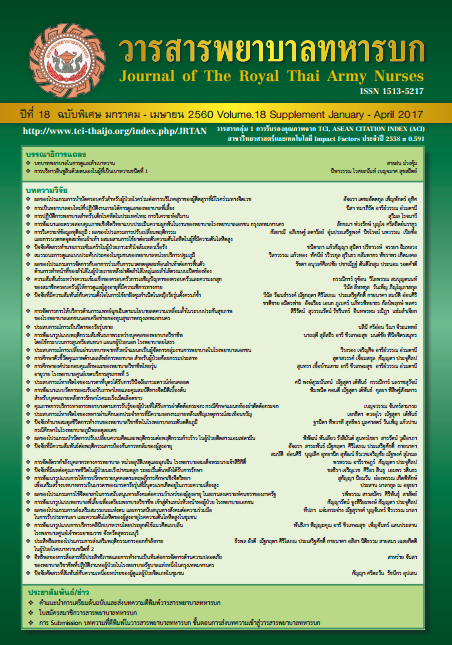ปัจจัยคัดสรรทำนายภาวะซึมเศร้าในผู้ป่วยภาวะหัวใจล้มเหลวเรื้อรัง
Keywords:
อาการหายใจลำบาก, ความแตกฉานทางสุขภาพ, แรงสนับสนุนทางสังคม, ความรู้สึกไม่แน่นอนในความเจ็บป่วย, ภาวะซึมเศร้า, Dyspnea, Health literacy, Social support, Uncertainty in illness, DepressionAbstract
การวิจัยเชิงทำนายครั้งนี้ มีวัตถุประสงค์เพื่อศึกษาภาวะซึมเศร้าและศึกษาปัจจัยทำนายภาวะซึมเศร้าในผู้ป่วยภาวะหัวใจล้มเหลวเรื้อรัง โดยใช้ทฤษฎีความไม่แน่นอนในความเจ็บป่วยเป็นกรอบแนวคิดในการวิจัย เลือกกลุ่มตัวอย่างตามสะดวก คือ ผู้ป่วยภาวะหัวใจล้มเหลวเรื้อรัง จำนวน 110 คน จากแผนกตรวจโรคผู้ป่วยนอกระบบหัวใจและหลอดเลือด โรงพยาบาลระดับตติยภูมิ 3 แห่ง เขตกรุงเทพมหานคร เครื่องมือที่ใช้ในการวิจัย ประกอบด้วย แบบสอบถามข้อมูลส่วนบุคคล แบบประเมินภาวะซึมเศร้า แบบสอบถามความรู้สึกไม่แน่นอนในความเจ็บป่วยแบบประเมินอาการหายใจลำบาก แบบประเมินความแตกฉานทางสุขภาพและแบบประเมินแรงสนับสนุนทางสังคมเครื่องมือวิจัยทั้งหมดผ่านการตรวจสอบความตรงตามเนื้อหาโดย ผู้ทรงคุณวุฒิ และมีค่าสัมประสิทธิ์แอลฟาครอนบาคระหว่าง 0.73-0.89 วิเคราะห์ข้อมูลด้วยสัมประสิทธิ์สหสัมพันธ์เพียร์สันและสัมประสิทธิ์สหสัมพันธ์ถดถอยพหุคูณผลการวิจัยพบว่าผู้ป่วยภาวะหัวใจล้มเหลวเรื้อรังร้อยละ 26.50 มีคะแนนซึมเศร้าอยู่ในช่วง 16-29 คะแนน อาการหายใจลำบาก ความรู้สึกไม่แน่นอนในความเจ็บป่วยมีความสัมพันธ์ทางบวกกับภาวะซึมเศร้าและความแตกฉานทางสุขภาพมีความสัมพันธ์ทางลบกับภาวะซึมเศร้าในผู้ป่วยภาวะหัวใจล้มเหลวเรื้อรังอย่างมีนัยสำคัญทางสถิติที่ระดับ.05 (r = .48, .26 และ -.38 ตามลำดับ) ในขณะที่แรงสนับสนุนทางสังคมไม่มีความสัมพันธ์กับภาวะซึมเศร้า โดยอาการหายใจลำบากความแตกฉานทางสุขภาพแรง สนับสนุนทางสังคม และความรู้สึกไม่แน่นอนในความเจ็บป่วยสามารถร่วมกันทำนายความผันแปรในภาวะซึมเศร้าได้ร้อยละ38.4 (R2 = .384, F= 16.36, p< .05)
Selected Factors Predicting Depression in Person with Chronic Heart Failure
The purpose of this descriptive predictive research were to examine depression in patients with chronic heart failure, and identify the factors that would predict depression using the Uncertainty in Illness theory. A convenience sample of 110 persons with chronic heart failure were recruited from OPD Cardio of three the tertiary hospitals in Bangkok. Research instruments were six questionnaires, including the assessment of Demographic data, depression, uncertaintyin illness, dyspnea, health literacy and social support. Content validity of questionnaires was validated by experts and the Cronbach’s alpha coefficients ranged from 0.73 - 0.89. Data were analyzed using Pearson’s product moment correlation coefficient and multiple regressions. The major findings were as follows:Twenty-four patients with chronic heart failure (26.50%) had CES-D score ranged from 16-29. Dyspnea, health literacy and uncertainty in Illness were significantly correlated with depression among patients with chronic heart failure. (r = .48, -.38 and .26 respectively, p<.05). While social support was no significantly correlated with depression among patients with chronic heart failure. Dyspnea, health literacy, social support and uncertainty in illness could significantly predict to depression and together accounted for 38.4% of the variance explained in depression. (R2 = .384, F = 16.36, p< .05)
Downloads
Downloads
How to Cite
Issue
Section
License
บทความหรือข้อคิดเห็นใดใดที่ปรากฏในวารสารพยาบาลทหารบกเป็นวรรณกรรมของผู้เขียน ซึ่งบรรณาธิการหรือสมาคมพยาบาลทหารบก ไม่จำเป็นต้องเห็นด้วย
บทความที่ได้รับการตีพิมพ์เป็นลิขสิทธิ์ของวารสารพยาบาลทหารบก
The ideas and opinions expressed in the Journal of The Royal Thai Army Nurses are those of the authors and not necessarily those
of the editor or Royal Thai Army Nurses Association.






